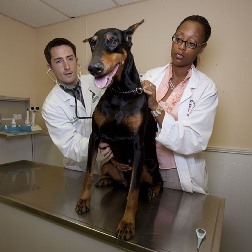How to Pick a Vet Assistant Program in Georgia
 Achieving your lifelong aspiration of working with and caring for pets by enrolling in a veterinarian program in Georgia could at first feel like a challenging endeavor. After all, you have to locate and enroll in a program that will provide the appropriate training to ensure that you can succeed as a veterinary technician, assistant or technologist. But just how do you approach reviewing and comparing programs so that you can make the best choice? Many aspiring students start their due diligence process by looking for schools that are close to their homes. Once they have found some nearby schools, they ascertain which ones have the lowest tuition and focus on those. Although expense and location are important concerns when comparing vet tech schools, they are by no means the only important ones when making your evaluations. Qualifications such as accreditation and internship programs need to be looked into also. The point is that there are questions you should be asking the veterinary tech programs you are evaluating before you make an ultimate choice. We have furnished several within this article to help get you started, but before we discuss them we’ll explore the varied duties of veterinary techs and assistants and the training alternatives offered.
Achieving your lifelong aspiration of working with and caring for pets by enrolling in a veterinarian program in Georgia could at first feel like a challenging endeavor. After all, you have to locate and enroll in a program that will provide the appropriate training to ensure that you can succeed as a veterinary technician, assistant or technologist. But just how do you approach reviewing and comparing programs so that you can make the best choice? Many aspiring students start their due diligence process by looking for schools that are close to their homes. Once they have found some nearby schools, they ascertain which ones have the lowest tuition and focus on those. Although expense and location are important concerns when comparing vet tech schools, they are by no means the only important ones when making your evaluations. Qualifications such as accreditation and internship programs need to be looked into also. The point is that there are questions you should be asking the veterinary tech programs you are evaluating before you make an ultimate choice. We have furnished several within this article to help get you started, but before we discuss them we’ll explore the varied duties of veterinary techs and assistants and the training alternatives offered.
The Responsibilities of a Vet Technician and Assistant
 Among the first decisions that you will have to make is whether you want to train as a vet technician, assistant or technologist. Part of your preference might be predicated on the amount of time and money that you have to commit to your education, but the primary factor will most likely be which specialization interests you the most. What vet techs and assistants have in common is that they both work under the immediate supervision of a practicing and licensed veterinarian. And while there are many jobs that they can carry out within the Georgia veterinary practice or hospital, they can’t prescribe medications, diagnose health issues, or perform surgical procedures. In those areas they may only provide assistance to a licensed vet. There are technicians and technologists that work away from the conventional vet practice, for instance for zoos, animal shelters or law enforcement. Let’s take a look at the responsibilities and training requirements for each specialty.
Among the first decisions that you will have to make is whether you want to train as a vet technician, assistant or technologist. Part of your preference might be predicated on the amount of time and money that you have to commit to your education, but the primary factor will most likely be which specialization interests you the most. What vet techs and assistants have in common is that they both work under the immediate supervision of a practicing and licensed veterinarian. And while there are many jobs that they can carry out within the Georgia veterinary practice or hospital, they can’t prescribe medications, diagnose health issues, or perform surgical procedures. In those areas they may only provide assistance to a licensed vet. There are technicians and technologists that work away from the conventional vet practice, for instance for zoos, animal shelters or law enforcement. Let’s take a look at the responsibilities and training requirements for each specialty.
- Vet Assistants in most cases will have undergone a structured training program, either as an apprentice or intern in a practice, or by finishing a certificate program at a community college or trade school in Georgia. As the name implies, their job function is to assist the vets and vet technicians in the performance of their duties. Normally they are not associated with more complicated undertakings, for instance assisting with surgical procedures. A few of their regular functions may include working at the front desk, cleaning and preparing examination rooms and equipment, or controlling animals during examinations.
- Vet Technicians go through more extensive training compared with assistants and usually earn a two year Associate Degree, preferably from an American Veterinary Medical Association (AVMA) accredited program. They are in a sense the veterinary equivalent of medical nurses, since their fundamental job function is to assist veterinarians with diagnosing and treating animal patients. Where they vary from vet assistants is that they are involved in more complex tasks, for example assisting with surgical procedures or administering medication. All states presently mandate that veterinary technicians pass a credentialing exam for either certification, registration or licensing.
- Vet Technologists are comparable to veterinary techs and basically perform the same job functions. They are mandated to attain a Bachelor’s Degree in veterinary technology, which typically takes four years to complete. Therefore the only real difference between a vet technologist and a technician is the technologist’s higher level of education. But with an advanced degree comes more career opportunities, increased salaries and potential management positions. They are additionally mandated to pass a credentialing exam for either registration, certification or licensing.
Vet techs and technologists can specialize in areas such as anesthesia, internal medicine or emergency care. Some may earn certification from the American Association for Laboratory Animal Science (AALAS) to work in laboratories or Georgia research facilities as well.
Online Veterinary Training Classes
 An approach that might be a solution for those with a hectic schedule or who are working full time while going to veterinary college is to enroll in an online program. Because the classes are offered through the internet, students can attend on their own timetable wherever a computer is accessible. The educational program is taught using multiple venues, including slide shows, videos and live streaming webinars. And since the majority of veterinary technician and technologist degrees require practical training, that portion can usually be completed as an internship or work study program at an area Georgia veterinary clinic or hospital. Distance learning, as it is also called, can in some instances reduce the cost of your education. Tuition and ancillary costs, for example for commuting and study materials, may be cheaper compared to more conventional classroom courses. Just confirm that the online school that you select is accredited, either by the AVMA or another nationally recognized accrediting agency. With the online classes and the practical training, everything is furnished for a comprehensive education. So if you are disciplined enough to learn in this more self-reliant fashion, an online veterinary tech or assistant school may be the perfect option for you.
An approach that might be a solution for those with a hectic schedule or who are working full time while going to veterinary college is to enroll in an online program. Because the classes are offered through the internet, students can attend on their own timetable wherever a computer is accessible. The educational program is taught using multiple venues, including slide shows, videos and live streaming webinars. And since the majority of veterinary technician and technologist degrees require practical training, that portion can usually be completed as an internship or work study program at an area Georgia veterinary clinic or hospital. Distance learning, as it is also called, can in some instances reduce the cost of your education. Tuition and ancillary costs, for example for commuting and study materials, may be cheaper compared to more conventional classroom courses. Just confirm that the online school that you select is accredited, either by the AVMA or another nationally recognized accrediting agency. With the online classes and the practical training, everything is furnished for a comprehensive education. So if you are disciplined enough to learn in this more self-reliant fashion, an online veterinary tech or assistant school may be the perfect option for you.
What to Ask Veterinary Assistant and Technician Degree Programs
 By now you probably have decided on which veterinarian credential that you wish to obtain, and if you want to study online or attend a school on campus. Since there are a large number of veterinary community colleges, vocational and technical schools in Georgia and across the Country, you must ask some qualifying questions in order to narrow down your list of alternatives. As we mentioned in our introduction, many potential students start by prioritizing location and tuition expense. But we have previously touched on other essential qualifiers, for example internship programs and accreditation. And naturally you want to select a college that offers the degree and specialty that you want to earn. These and other factors are covered in the list of questions that you should ask the vet assistant and technician programs that you are reveiwing.
By now you probably have decided on which veterinarian credential that you wish to obtain, and if you want to study online or attend a school on campus. Since there are a large number of veterinary community colleges, vocational and technical schools in Georgia and across the Country, you must ask some qualifying questions in order to narrow down your list of alternatives. As we mentioned in our introduction, many potential students start by prioritizing location and tuition expense. But we have previously touched on other essential qualifiers, for example internship programs and accreditation. And naturally you want to select a college that offers the degree and specialty that you want to earn. These and other factors are covered in the list of questions that you should ask the vet assistant and technician programs that you are reveiwing.
Is the Vet School Accredited? It’s important that you verify that the vet technician or assistant program you choose is accredited by a regional or national accrediting organization. As previously stated, one of the most highly respected is the American Veterinary Medical Association (AVMA). Trade schools and colleges that are accredited by the AVMA have gone through a thorough review process that confirms you will obtain a quality education. Also, accreditation is necessary if you are applying for a student loan or financial assistance, since many programs are not offered for non-accredited programs. And finally, having a certificate or degree from an accredited program is frequently a precondition for employment for many Georgia veterinary practices and hospitals.
What is the College’s Reputation? The veterinary college or vocational school and program you select should have an outstanding reputation within the veterinarian community. You can begin your due diligence by asking the schools you are reviewing for testimonials from the employers in their job placement network. Other tips include checking with internet school ranking websites and checking with the school’s accrediting agencies as well. You can ask the Georgia school licensing department if there have been any grievances or infractions regarding your targeted schools. As a final tip, get in touch with some vet clinics that you may want to work for after you receive your training. Find out what they think about your school choices. They may even suggest some schools not on your list.
Are Internships Offered? The most effective means to get practical hands on experience as a vet assistant or tech is to work in a medical environment. Find out if the programs you are considering have internship programs set up with area veterinarians, vet hospitals or practices. Most veterinary medicine programs require clinical training and many provide it through internships. Not only will the experience be invaluable as far as the practical training, but an internship may also help develop associations in the local Georgia vet community and aid in the search for employment after graduation.
Is Job Assistance Provided? Getting a job after graduating from a veterinary tech or assistant college can be difficult without the help of a job placement program. To begin with, ask what the graduation rates are for the schools you are evaluating. A low rate may mean that the teachers were ineffective at teaching the syllabus or that some students were dissatisfied with the program and dropped out. Next, check that the colleges have a job placement program and ask what their placement rates are. A high placement rate might mean that the Georgia school has an excellent reputation within the veterinary community and has a substantial network of contacts for student placements. A low rate could indicate that the training is not well thought of by employers or that the job assistance program is ineffective at placing students.
How Large are the Classes? If the classes are larger, you may receive little or no individualized instruction from the teachers. Request from the Georgia schools you are considering what their classroom teacher to student ratios are. You might also want to attend a few classes (if practical) to monitor the interaction between students and teachers. Ask for evaluations from students concerning the quality of instruction. Also, talk with the instructors and find out what their qualifications are as well as their methods of teaching.
Where is the School Located? Okay, we already discussed location, but there are a few more points to make on the topic. If you are going to drive to your veterinary assistant classes from work or home, you have to confirm that the commuting time is compatible with your schedule. For example, driving during the weekend to investigate the route won’t be the same as the commute during rush hour traffic, particularly if the Georgia campus is located in or near a larger city. Also, if you do opt to enroll in a school in another state or even outside of your County of residence, there may be higher tuition costs particularly for community and state colleges. Of course taking online classes might be an option that will give you more flexibility and reduce the need for travel.
Is the Class Schedule Flexible? And finally, it’s important that you find out if the Georgia veterinary programs you are considering offer class times that are sufficiently flexible to fit your schedule. For instance, a number of students continue to work full time and can only attend classes on the weekends or in the evenings. Some might only be able to attend classes in the morning or in the afternoon. Confirm that the class times you need are available prior to enrolling. Also, determine if you can make up classes that you might miss as a result of work, sickness or family emergencies. You might find that an online program is the best solution to fit your veterinary training into your busy life.
Pick the Right Veterinary Technician Program in Georgia
Choosing the appropriate veterinary technician school is a crucial first step to beginning a rewarding career providing care and treatment for pets and livestock. Future students looking into vet assistant or tech programs need to make their determination based on multiple key issues. Vet assistants, techs and technologists work in vet clinics, animal hospitals and animal shelters. They commonly handle administrative responsibilities and assist the veterinarian with the animals as needed. As we have discussed, it’s very important that you pick a veterinary medicine program that is both accredited and has an excellent reputation within the field. This goes for vet tech online schools as well. By asking the questions provided in our checklist for assessing schools, you will be able to narrow down your options so that you can make your final selection. And by picking the best program, you can achieve your goal of becoming a vet technician, assistant or technologist.
